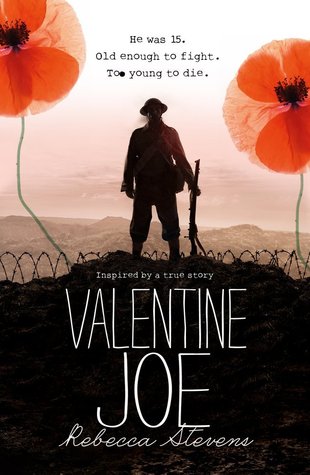In Flanders field the poppies blow
Between the crosses, row on row,
That mark our place; and in the sky
The larks, still bravely singing, fly
Scarce heard amid the guns below
John McCrae 'In Flanders Fields', Essex Farm 1915
For several weeks before Armistace Day, the cheerful red poppies associated with the Royal British Legion's annual Poppy Appeal are omnipresent in England. Every schoolchild knows that they are associated with World War I: with 'remembrance', with honouring the dead, with supporting the armed forces. The two minute silence is honoured all over the country, but I wonder how many young people are focusing their thoughts on sacrifices made so long ago? For those who do not have a specific family member to remember, is there another way to make a mental and emotional connection with 'historical' events? I would argue 'yes'. A well-told story has the ability to powerfully concentrate the mind, and there are several recently published UKYA novels that truly do bring World War I back to life again.
Rebecca Stevens published Valentine Joe in 2014, the centenary of the beginning of the war. Valentine Joe Strudwick was a real person; he died at Ypres at the age of 15, and was buried in the Essex Farm cemetery immortalized by John McCrae's famous poem. In this unusual novel, a contemporary storyline is skilfully woven together with the historical one. Rose and her Grandad are visiting Essex Farm when she spots Valentine Joe's gravestone. Rose is still in mourning for her own father, who has recently died. Through the device of a scrappy stray dog called Tommy, Rose manages to time-travel back to the battleground of Ypres and meet Joe. Rose's state of mind is so attuned to grief and loss that she is able to connect directly with Joe, and in a very sweet and subtle way they each manage to heal something in the other. History really is brought back to life in this book.
Mary Hooper, a name particularly associated with historical fiction for young adults, has published two novels in the last 18 months which view the 'War to End All Wars' from the perspective of Poppy Pearson, a young VAD nurse. At the beginning of the war, Poppy is working in 'service' as a parlourmaid for the de Vere family. Poppy is intelligent and able, but social class and lack of money -- her mother has been widowed with four children -- have narrowed her options. The war brought many unexpected social changes, particularly for women, and Poppy is able to develop useful skills, travel and mix with other social classes precisely because qualified nurses were in such demand. Initially, Poppy is attached to a hospital in Southampton; later, in Poppy in the Field, she nurses wounded and dying men in France. The storyline touches on how the brutality of trench warfare forced improvements and innovations in medical care -- everything from the mental illness described as 'shell shock' to experimentation in plastic surgery and prosthetics. Throughout both novels, the broken bodies and spirits that Poppy tends to are made very real. There is one particular scene in which Poppy has to clean up a soldier nicknamed 'Tibs' who has came straight from the battlefield. The description of Poppy cutting off Tibs' boots, and discovering an advanced case of trench foot, is not one that I will soon forget. But having said that, the narration is far from melodramatic. The novel has many poignant moments; but considering the source material, how could it be otherwise?
World War I changed the world in many ways, but one enduring legacy has been a change in the way war itself is viewed.



I like how your novel reviews follow the calendar. I don't usually pay much attention to the real world on my blog, but this week the news events are too horrific to ignore, not only what has happened but what may happen. Historical novels such as these are important in reminding us of the lessons of history and warfare. I long for peace.
ReplyDelete